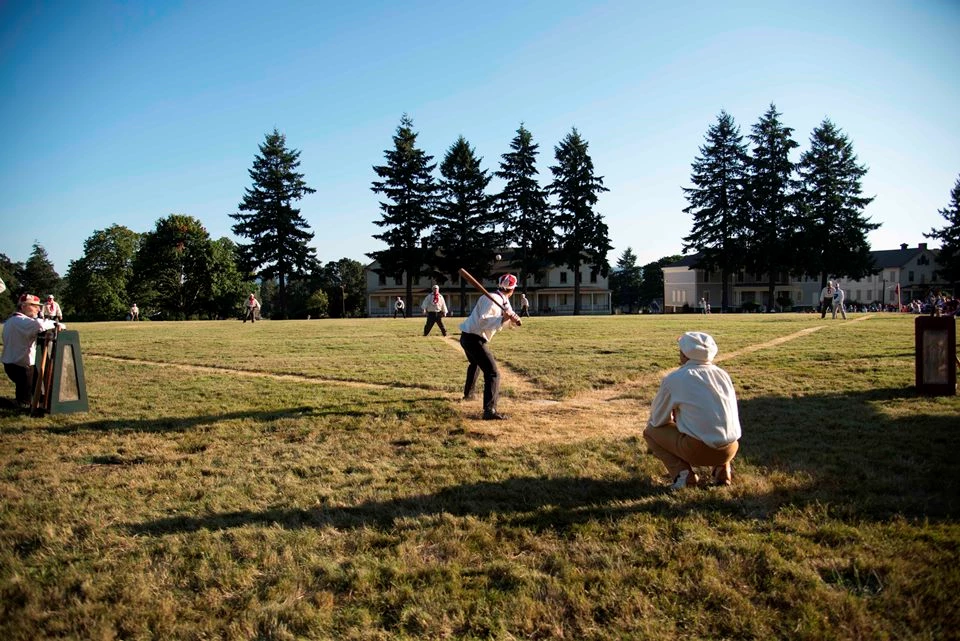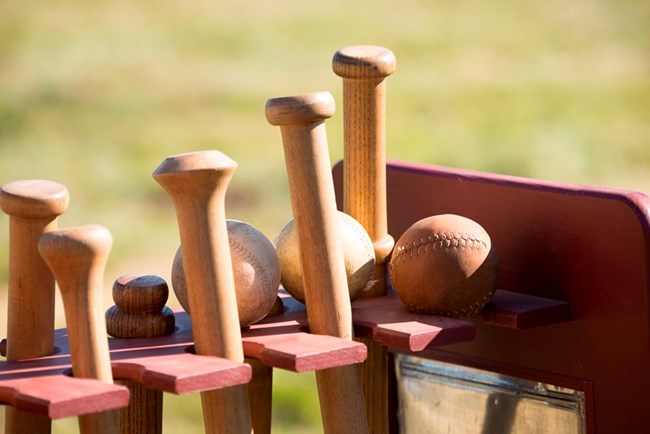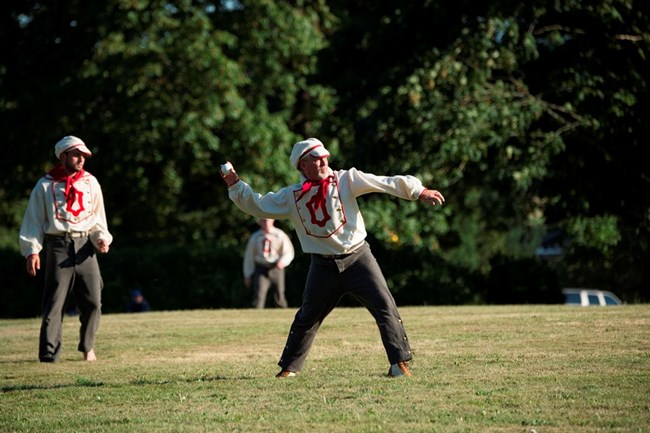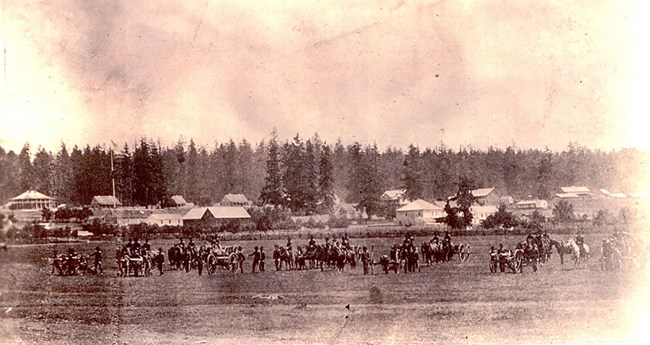Last updated: October 31, 2019
Article
"The National Game is Decidedly 'On the Fly'": The Rise of Organized Base Ball in the Portland and Vancouver Area in 1867

NPS Photo by Troy Wayrynen
Introduction
In July 1867, the Oregon City Enterprise reported a peculiar observation from a Portland, Oregon, correspondent. "On several occasions, of moonlit nights," they related, "the police have caught parties engaged in practice on the flat roofs of some of the brick buildings."The same activity provoked protest from at least one Portlander. "In the name of humanity," he wrote to the Portland Morning Oregonian in August, "how long are we to be afflicted with this...nonsense?" Annoyed and dumbfounded by the activity, he openly wondered "of what possible interest can it be to the mass of readers?" Comparing it to "marbles, blind man's bluff, hide and seek, old sister Phoebe," he asked, "but who, in the name of reason, would expect to see elaborate weekly reports...in the papers?" "Come now," he chided, "take a second thought and show a little mercy on a NERVOUS MAN." In response, the Morning Oregonian offered little to calm his nerves. "All we know," they opined, "is that the end is not yet; that the National Game is decidedly 'on the fly', and we cannot, considering all the signs of the times, predict for a...'short stop'."
What was this activity practiced so widely it even utilized rooftops and evenings as a setting? What activity saturated Portland-area newspapers in the eyes of at least one citizen? What was this growing National Game described by the Morning Oregonian?
It was baseball; or rather, "base ball." In the year 1867, Portland, Oregon, and nearby Vancouver, Washington Territory, along with neighboring communities, including Oregon City, Oregon, saw an explosion in the popularity of what had, ten years before, been dubbed America's national pastime. From the reported first match game in 1866 between two of the area's first organized clubs - the Pioneer Base Ball Club of Portland and the Clackamas Base Ball Club of Oregon City - the number of teams skyrocketed by July 1867 to a reported seventeen clubs in Portland alone.
Organized Base Ball Begins in Portland
On October 13, 1866, the Clackamas Base Ball Club of Oregon City hosted the Pioneer Base Ball Club of Portland in a challenge match of base ball. Following a brass band procession and a hearty breakfast, the game began in earnest. Despite a late inning comeback by the Clackamas Club, the Pioneer Club prevailed by a final score of 77 to 45. "This is the first match game ever played in the State," pronounced the Morning Oregonian, "and it is a splendid beginning."Although the Portland/Vancouver area had played host to variations of bat and ball games for decades - for example, evidence exists of cricket matches played at the Hudson's Bay Company's Fort Vancouver - organized base ball arrived in the area shortly after the end of the American Civil War. While the organization of the Pioneer and Clackamas Clubs is outside teh scope of this study, their start in 1866 paved the way for the broad scale eruption of interest in the sport the following year.
Base Ball Begins in Vancouver
As Portland area citizens emerged in the spring of 1867 from their annual rain-induced winter respite, interest in base ball grew. As a result, the number of clubs skyrocketed as new ones sprung up in the cities and towns surrounding Portland.By May 18, the Oregon City Enterprise reported that "Vancouver has not only an efficient fire department, but sports two base ball clubs." Presumably these first clubs were the Occidental Base Ball Club and the Sherman Base Ball Club, the latter of which consisted of soldiers from Vancouver Barracks. By autumn of 1867, Vancouver sported at least three additional teams, including the Washington Base Ball Club, the Continental Base Ball Club, "composed entirely of young men and boys," and the Oriental Base Ball Club of the Fourth Plain.

NPS Photo by Troy Wayrynen
Protocol, Order, and Function: The Organization of a Club in 1867
As their names suggest, these groups organized as clubs. As such, they were highly structured social organizations - not businesses - and members participated on a voluntary basis, paying dues rather than being paid to play. Reflecting the spirit of the era, the clubs emphasized gentlemanly order and organization, and employed a structure that reinforced and codified it.At their initial organization, it is likely that many of the clubs followed the same protocol as that of the Highland Base Ball Club of Oregon City, established in 1867. The minutes of the club's meetings and the treasurer's book, in the collection of the Oregon Historical Society Research Library, provide much insight into the process of organizing and operating a base ball club in the Portland/Vancouver area in 1867.
On June 17, 1867, following a call to order the attendees at the inaugural meeting of the Highland Base Ball Club elected five positions: a president, vice president, secretary, treasurer, captain of the first nine, and captain of the second nine. This is consistent with other clubs formed the same year; for example, at one of their first meetings, the Wide-awake Club elected a president, vice president, secretary, treasurer, and a captain. The president, then, appointed three directors. According to Beadle's Dime Base-Ball Player, the leading base ball guideline at the time, the duty of the three directors was threefold: to take charge of the equipment and other "implements of the club," to establish the beginning and end times for field exercises, and to "tend all miscellaneous duties not otherwise provided for."
Following these elections, the club president then appointed three attendees to draft both a constitution and bylaws. Several models no doubt existed; in addition to the sample constitution and bylaws included in an appendix to Beadle's, the established Pioneeer and Clackamas clubs may have lended administrative support. As the next item of business, the club adopted their official name.
As the Highland Base Ball Club regularly met, administrative functions continued to play a primary role in club organizational efforts. In the minutes kept from the subsequent ten club meetings, the emphasis on organization and order is striking. For example, at the second meeting, the club adopted the report of the committee on constitution and bylaws. Demonstrating how base ball clubs sought standardization of the game and a connection to other clubs in the region, the club also duly adopted the “Constitution, Bylaws, Rules, and Regulations of the Pacific Base Ball Convention,” established in San Francisco the preceding August.
In addition to the organization of new clubs, the spring of 1867 also brought calls for greater organization of the sport as a whole. Proposals for a statewide organization that would systematize Oregon clubs, provide opportunities for them to play clubs in California, and facilitate the playing of a match game for the Oregon state championship were publicized in the press. In addition, enough interest existed for a Portland bookseller to advertise copies of the Pacific Base Ball Guide for 1867 for sale. “Its rules,” read the announcement, “have been adopted by the Pacific Base Ball Convention of California.” Commercial opportunities were not limited to rule books, as clubs needed other equipment, including balls, bats, and uniforms. By August, the Enterprise advertised “a very neat style of base ball caps, which sell rapidly and give universal satisfaction."

NPS Photo by Troy Wayrynen
Vancouver's Occidental Base Ball Club
In the spring of 1867, one of the first new clubs formed on the north side of the Columbia River—the Occidental Base Ball Club of Vancouver. At the time, Vancouver, Washington Territory, despite being established before Portland, was smaller in population. Portland newspapers referred to it as Vancouver or Vancouver Village. In May, the assessor for Clark County reported that Vancouver harbored a population of 2,105 residents: 1,150 men and 955 women.Unfortunately, fewer than five issues of Vancouver’s weekly newspaper, the Register, survive from 1867, and those that do are from October and November, months not as conducive to base ball or base ball reporting as those earlier in the year. Thus, the author has sought information from other sources in an effort to piece together information on the club.
One of the Occidental Club’s earliest matches occurred on Saturday, May 11. Interestingly, the local soldiers of Vancouver Barracks provided the opposing squad. The Oregon Herald reported that “the first nine of the Garrison Base Ball Club challenged the first nine of the Vancouver Club to play a match game for the championship.” In a similar blurb, the Enterprise noted that “the Garrison Boys scored 45, while the Vancouver boys were making 5.” Not a paper to pass up an opportunity for editorial comment, they added, “[t]his is a pretty bad flaxing.” The Herald also noted the “flaxing” but added that “it does not appear to discourage the Vancouver boys, who are determined by hard exercise to regain their prestige.”
As predicted by the Herald, this initial setback does not appear to have thwarted the Occidental Club’s interest in the game. Just over two weeks later, on Wednesday, May 29, the first recorded match between the Occidental Club and the Pioneer Club of Portland occurred. The match day was a long affair; the Pioneer Club and spectators from Portland departed on the steamer Cascades at 6:00 a.m. that morning, and were greeted by the Occidental Club who escorted them to the playing field “which had been put in splendid order for the match.” As a correspondent from Vancouver described in a letter to the Herald:
The day was beautiful; the ground which the Occidental Club had selected was in the heart of the city, and nothing was left wanting to secure a happy time and an exciting contest; and to add to the gay scene, the youth and beauty and blushing smiles of our ladies contributed in no small degree to make it the most exciting affair we have had in this place for a long time.
The starting nine for the Occidental Club included H.C. Morse at second base, S. Brand at third base, Jacob Proebstel at first base, Daniel Leahy at catcher, team captain P. McNamara pitching, James Petrain in right field, William Leahy at shortstop, R.J. Glover in left field, and James A. Orr in center field. Scorer H.T. Levins kept the game’s statistics, and also submitted a detailed summary that was published in the Morning Oregonian. McNamara, “being an old eastern player, recently from States,” was credited with preparing his players well. “The Occidentals played an excellent game, considering that they were only organized this season,” noted Levins. Demonstrating the tightly-knit base ball community in the area, also in attendance was a delegation from the Clackamas Club of Oregon City.
The match progressed well, but controversy soon ensued. According to the Morning Oregonian’s account:
On the other hand, the Vancouver correspondent to the Herald minced no words is his description.At the commencement of the game it was evident there was some dissatisfaction on the part of the Occidentals, from the fact that according to the rules established by the National Convention, of which the Pioneers are members, the Umpire in a match game must be chosen from a club being a member of that body, and E. Backenstos of the Pioneers being chosen to the position. In the second inning a dispute arising the Occidentals became clamorous for a change, accordingly the Pioneers waived the rule, and told them to make their own choice, which resulted in the selection of P.T. Barclay, of the Clackamas base Ball Club to fill the position.
The exact nature of the second inning dispute with the umpire is unknown, though subsequent official correspondence from the Occidental Club refers to the “unintentional failure on his part to observe the proceedings of the game.”The Umpire selected in the morning was E. Backinstock who, in violation of the good faith imposed in him, acted so partial on the 2d innings in favor of the Pioneer Club, that even they, to a man, (I am proud to say) thought, as did the members, that he was spreading it on so thick that he must be removed and a new one appointed in his place, which was accordingly done…. After all, I must say that had the clubs had such a man for umpire as Mr. Barclay in the first place, the Occidental Club would have won the game.
As the match continued into the third inning, Occidental shortstop Leahy switched positions with teammate Glover in left field, without informing the Pioneer Club or, ostensibly, his own team captain McNamara. Such a move, described as “positively against the fundamental rule of the game,” elicited protest from the Pioneers, and Occidental captain McNamara responded, claiming that the switch was done without his knowledge or consent. As a result, the Pioneer’s captain “gave him [McNamara] two fly catches to which they were not entitled, thus making but one run in the inning.” After three hours and forty-five minutes, the match ended, with the Pioneer Club victorious by a score of 79 to 62. The champions subsequently honored the Occidental Club with three hearty cheers, which the Occidentals returned. Both clubs joined in three cheers for Umpire Barclay and the two scorers, followed by three cheers for the ladies present in the audience.
Despite the controversy, gentlemanly behavior remained the order of the match, and both sides ensured the event was a positive experience for spectators, including the Herald’s Vancouver correspondent.
Club activities often included other pursuits that supported base ball through more traditional—and formal—events. Thus, immediately following the match, a “bountiful dinner” at the Alta House greeted participants and spectators. In addition, and as reported in the Morning Oregonian earlier in the week, the club hosted an evening ball open to all.It is seldom we have ever witnessed such a game, and where so much friendly rivalry is expected, that turned out as did this one. All seemed to vie with each other as to who could be most courteous, and for the latter I think it would be hard to find the equals of the Pioneer boys.
Interestingly, the controversy surrounding the match game’s umpire continued into the subsequent week. This was due, almost exclusively, to the aforementioned account of the Herald’s Vancouver correspondent, listed as only as B.O.R. In particular, his charge that Backenstos violated “the good faith imposed in him” implied premeditated bias and fraud rather than unintentional human error and thus directly called into question his character as both an umpire and a gentleman. For the era, this was no minor charge.The dancing men and women of this city [Portland] will be pleased to learn that the Occidental Base Ball Club of Vancouver has determined to close the day of the match game with a dancing party at Metropolis Hall, to which all the world and his wife and the rest of mankind are invited.
The same evening that the Herald published B.O.R.’s correspondence, the Pioneer Club called a special meeting and crafted two responses. In the first letter, club president Theodore F. Miner strongly declared that B.O.R.’s statement “is FLATLY CONTRADICTED, as will be seen by the subjoined resolutions.” In series of three resolutions, the Pioneer Club officially charged B.O.R. with “gross injustice”, claiming that he had “made assertions that reflect seriously upon his character as a gentleman.” They unanimously endorsed his conduct, vindicated him of the charge, and sent the resolutions to the Herald and Morning Oregonian for dissemination.
Following the Herald’s publication, the Occidental Club also responded quickly and formally. They too called a special club meeting where the following formal resolution unanimously passed.
At a special meeting of the members of the Occidental Base Ball Club, who were present at the match game played with the Pioneer Base Ball Club of Portland, held the 31st day of May, the following resolutions were unanimously adopted:
Resolved That the “Vancouver Correspondence” of the Oregon Herald signed “B.O.R.,” was not authorized by, nor is the same endorsed by the members of this club.
Resolved That Mr. E.D. Backenstos, an umpire, ought not to be charged with any conduct unbecoming a gentleman, or with any willful “violation of the good faith imposed to him,” but that the errors which, in our opinion be made in some of his decisions are to be ascribed to the unintentional failure on his part to observe the proceedings of the game, and not to any desire on his part to show any [illegible] or bias to either party.
Resolved That the conduct of our Portland friends at the recent game merits our admiration, and we assure them that we cherish the kindliest feeling of friendship for them and indulge in the hope that the most friendly relations may always exist between the two clubs.
Resolved That the publishers of the Portland dailies be requested to publish these resolutions and the Secretary be requested to forward a copy of the same to the Pioneer base ball Club.
Signed by Daniel Leahy, Jacob Proebstel, H.C. Morse, Lewis Brant, William Leahy, R.J. Glover, James Orr, James Petrain.
- P. McNamara, Captain
It should be noted that, reflecting both clubs’ perception of the seriousness of the letter’s charges, the clubs distributed their resolutions to both of Portland’s major newspapers for publication.
As the smoke cleared from this incident, the Occidental Club continued its season, playing several additional challenge matches. One notable match occurred in August in Vancouver, at the second match game between the Occidental Club and the Clackamas Club. The contest fomented much excitement, especially in Oregon City.
In another salvo, the paper quoted a “friend in Vancouver” who had telegraphed to say that they had “imported such a large beat from Oregon that the people were going crazy on the subject.” With tongue firmly planted in cheek, the paper noted that this Vancouverite “probably alluded to the beat given the Occidental Base Ball Club, by the first nine of the Clackamas Club of this city.”
The “strikes” made by a party of gentlemen who left this city on the morning of the 26th for Washington territory caused a genuine revival of the famous days ’49. Not a man in this town any wise given to “excitement” retired on the night of that day without being duly impressed with the value of the numerals 49, and great balls of chalk were used to write it down—on window panes, on garments, everywhere. You see that was the number of “runs” our boys made above the score of the Occidentals at Vancouver, in that second game of Base Ball.
As the season continued, the Occidental’s second nine chalked up a victory on September 8, defeating the first nine of the Continental Club of Vancouver by 35 runs. In the highly anticipated second match game on September 21, the Occidental Club hosted the rematch with the Pioneer Club. “As usual, however,” noted the Morning Oregonian with apparent relish, “the superior skill of the Pioneers told with splendid effect, and they came out best, making 56 runs to 22 by the Occidentals.” The Occidental Club kept very busy in September, as they scheduled their match with the Pioneers in between the second and third match games with the local Sherman Club.

Image IIISC-89759, National Archives and Records Administration
Vancouver Barracks' Sherman Base Ball Club
On June 1, 1867, the Morning Oregonian carried an earlier account from the Vancouver Register announcing a new base ball club. “We learn that another Base Ball Club will be formed shortly in this place, and which will [illegible] principally of officers stationed at this post.” Shortly thereafter, newspapers carried accounts of “the Garrison boys” playing a match game with the Occidental Club of May 11. Within weeks, a club known as the Sherman Base Ball Club began playing match games against other clubs in the area.In early 1867, local Army personnel at Fort Vancouver, one of the Army’s major western posts, were in the final stages of a nationwide reorganization. During the Civil War, the War Department reassigned most Regular Army troops then stationed at many western posts, including the barracks, to duty east of the Mississippi River. As a replacement force, individual states mustered regiments of volunteers, such as the First Oregon Volunteer Infantry, which were then assigned to garrison duty at the vacated posts. By May 1867, the volunteer units serving at the barracks had either been reassigned to other posts or mustered out; Regular Army units including the Eighth U.S. Cavalry Regiment’s Company C and the Second U.S. Artillery Regiment’s Battery F constituted the garrison of soldiers at the barracks. In July and August, the post’s garrison included the two aforementioned companies as well as the Post Band, members of the 1st U.S. Cavalry’s Field Staff & Band, and a detachment of the 1st U.S. Cavalry. August 1 saw the departure of post commander Capt. William Kelley and Company C of the Eighth Cavalry.
Further research may shed light on the affect on the Sherman Base Ball Club of a major component of the post’s garrison departing in early August. However, the club continued to exist and play several match games in the area well into November. Although they may indeed have played teams such as those fielded by the Clackamas, Highland, Wide-awake, and Pioneer Clubs, through preliminary research this author has yet to locate evidence of the Sherman Club playing match games against these clubs. Newspaper accounts suggest that the Sherman Club did play matches against at least three clubs—the Occidental, Spartan, and Continental Clubs.
In September, the Morning Oregonian announced a second match game between the Sherman and Occidental Clubs, to be held on September 14. Twelve days later, the Shermans and Occidentals met for the third game in the match on September 26. After battling for three hours and ten minutes, the game ended with a 52 to 25 victory for the Sherman Club. The Morning Oregonian carried a brief account of this game that listed the surnames and positions of both teams’ players. Accordingly, the Shermans fielded Shields at second base, Sharbone at catcher, Smith at first base, Corcoran in center field, Collins at third base, McGill at shortstop, Brown as captain and pitcher, Kenney in left field, and Gibbins in right field. Further research, of course, may provide more detailed information on these individuals.
The 1867 Season Ends
By late November, despite several match games in mid-month, base ball’s fortunes waned in the Pacific Northwest. Signs pointed to the rainy weather as the primary culprit. “We have an idea from what we heard on the ground,” noted the Register, “that the season is becoming rather unpropitious for a further continuance of this favorite sport.” Much as they do in the present day, area citizens began seeking indoor activities to ride out the damp winter months. “[S]ince we are to be driven indoors for our winter’s amusements,” suggested the Register, “let’s try and select some recreation as developing to the mind as base ball has been to the muscle of our citizens.”Thus, base ball had emerged in 1867 from relative obscurity to the level of “favorite sport” with lightning speed, toning gentlemanly muscle along the way. Fueled by the formation of dozens of new teams competing in publicly attended outdoor match games—and fomented by frequently colorful newspaper accounts—base ball’s popularity waxed propitiously in Portland, Vancouver, and the surrounding communities. As a bona fide gentlemanly leisure activity, base ball was certainly on the fly in 1867.
